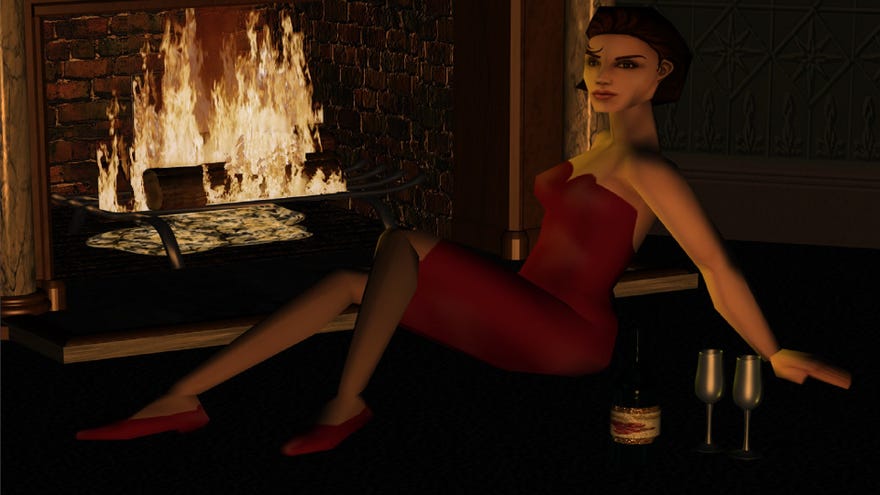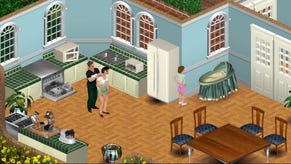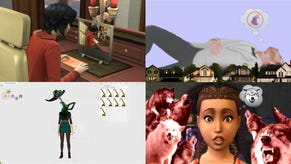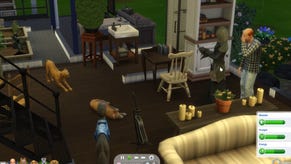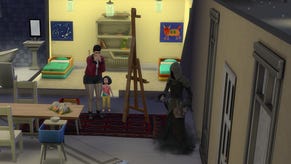Returning to The Sims 1 in 2023 is a weird challenge I fully recommend
Looking back at the first-ever Sims game for its historic 23rd anniversary
Start at the beginning, right? When faced with a self-imposed task as massive and daunting as writing a retrospective on The Sims franchise, going back to the very first game was the obvious launchpad. The original The Sims — now sometimes called The Sims 1 for the sake of clarity — was released in February 2000, and received regular updates via expansion packs through to October 2003. The game was the brainchild of Will Wright, the designer behind the SimCity series, who had decided to approach the world of his popular city-building franchise from a new angle. Switching from macro- to micro-management, Wright's new spin-off project aimed to focus on the architectural design of individual houses. As time went on, his creative interests would shift again, to also take in the lives of the people inside the buildings.
Social simulation wasn't an entirely new genre, and indeed Wright drew inspiration from 1985's Little Computer People (alternatively known as House-On-A-Disk). This Activision title was reasonably well-received in its day, but largely dismissed as a low-challenge educational game suitable only for young children. LCP also doesn't seem to have met sales expectations, judging by the fact that a series of planned add-on expansions never ended up getting made.
After Little Computer People fizzled, there seemed to be little appetite among developers for returning to the "virtual dollhouse" genre, and Wright's higher-ups at Maxis were unsure whether the idea was worthy of investment when he first pitched The Sims to them in the early '90s. It wasn't until Maxis was acquired by Electronic Arts in 1997, and EA expressed interest in an expanded SimCity franchise — on the understanding that paid add-ons would be quickly forthcoming if the concept proved popular — that development on The Sims really got off the ground.
For most of The Sims' four-year lifespan, I was in lockstep with every new expansion pack release. As a pre-teen, I eagerly awaited the biannual visit to Toys R Us that would see me return home clutching my latest digital plaything. Luckily, I had the presence of mind to hang on to those original CD-ROMs, so revisiting the franchise's origins to see how it's holding up these days was comparatively easy.
I elected, on this occasion, to install The Sims on a Windows Vista machine from 2008, five years after the game's final expansion/update. Even though the computer was old, the game was even older; thus it was a little over-specced, and the game didn't look or run quite as fantastically as it did in its prime. Still, it's true that the original graphics still look surprisingly good: stylistically it's properly retro, as in it's what a retro-inspired artist would probably put together today. What I mean is that it looks nearly as good as I remember it, which is actually impressive when you think about it. And in performance terms, if it's a little creaky at times (and my return did include one particularly distressing two-hours-of-gameplay-down-the-drain crash), it's certainly no worse now than it was back in the day. I remember when this was my everyday life, oh I do.
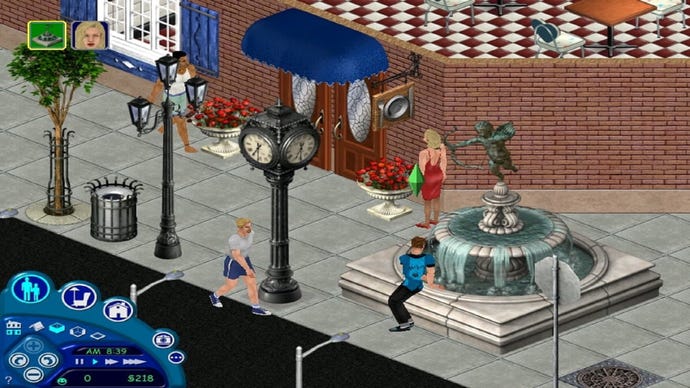
But it's hard to escape from the fact that even starting a new game of The Sims 1 in 2023 feels… off, if you're a fan of the newer games, even if you've been with the series from the start. In recent years I've lost entire days to The Sims 4's Create-A-Sim, tweaking everything from facial features to outfit accents in minute detail. Even though I remembered the process of the original CAS, I was honestly surprised by how limited I felt while picking just two skins — combining a pre-set head with a full-body multi-purpose outfit — for each character.
It reminded me of how, perversely, technical and graphical improvements in games can actually be limiting our creativity in a way. It may be embarrassing to admit this, but my play-style in The Sims hasn't changed a huge amount in the last 20-odd years. As a 10-year-old, I went in already wanting to use The Sims to re-create my favourite characters from pop culture. None of the skins in The Sims 1 remotely resembled them, but I was able to read onto them the references I wanted. Fast-forward a couple of decades and I'm frowning in bemusement at my screen because none of these faces look exactly right, and that's unacceptable! I didn't start this article expecting to be arguing that detailed character creators are the death of imagination, but here we are.
The 25-point personality build system introduced in The Sims feels quaint when you're accustomed to the trait-based system used from The Sims 3 onwards, but nowhere near as jarringly limited as the skin-selection for physical appearance. Even the lack of any kind of aspiration mechanic to guide your Sims' lives didn't feel all that weird to me. I suppose I must be better at reading those ideas onto my Sims than I am ascribing personalities to those weird off-the-peg faces. Maybe there is hope for my imaginative capabilities after all.
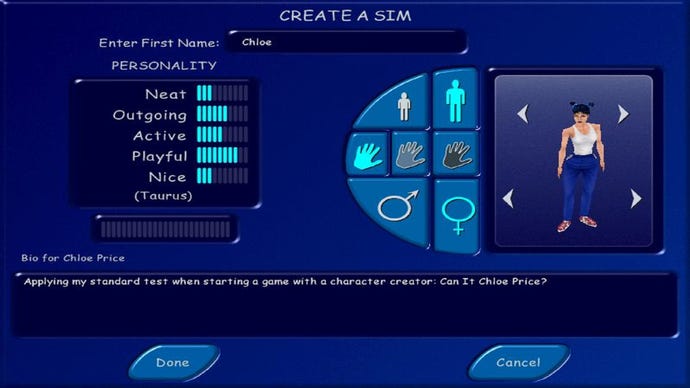
My single biggest take-away, though, was how much the Sims' AI has improved over the years. I'd last played The Sims 4 only the day before embarking on my retro adventure, so the comparison was fresh in my mind; and yes, while Sims to this day still engage in a fair bit of artificial stupidity, you don't really appreciate how far things have come along until you go back to the very beginning.
On my Sims' first day in their new house, for instance, their neighbours visited, as neighbouring Sims are wont to do. My poor Sim only wanted to use the toilet in his own home, but was interrupted by his neighbour walking brazenly into the bathroom — forcing him to cut short his relief in embarrassment. The neighbour then irritably demanded that he leave the room as she needed to use the toilet… but then her husband walked in, seemingly just wanting a chat, meaning she didn't conclude her business in one go either. This happened twice. Not a word of exaggeration, it took my poor fellow nearly all day to finish taking a piss.
Sims in newer games may still be dumb as rocks, but at least they're more polite now, in as much as they display some awareness of where other nearby Sims are and what they're doing. They at the very least understand when someone's using the loo behind that closed door, meaning that such invasions of privacy when they do occur are the result of flawed personalities and social situations (or a wicked player forcing the issue), not just an unavoidable result of needs-based pathfinding with no appreciation of context.
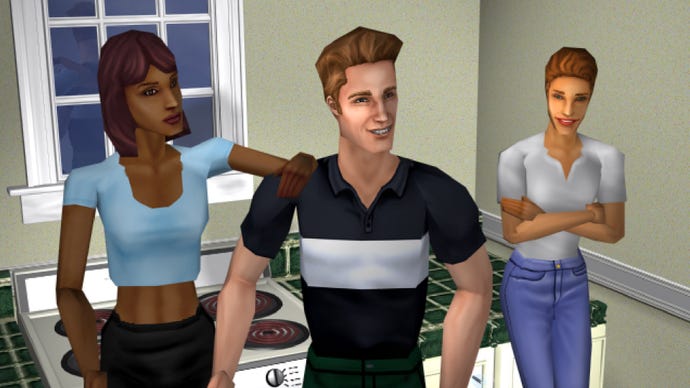
Somewhere early on in my return to The Sims 1, I got it into my head that it'd be a great idea to challenge myself not to use cheats. I thought it'd be more authentic, somehow, to play the game as the developers intended, at least for the first little while. Within a couple of in-game days, I'd remembered why The Sims and cheat codes are so deeply intertwined in our cultural consciousness. The odds of success in the original The Sims are massively stacked in the favour of the pre-created households, who land in the world with at least two or three basic necessities denied to player-created characters: a fully-furnished house, pre-existing relationships, and maybe even an entry-level job to tide them over in addition to a comparatively generous savings fund.
Within a couple of days, I'd remembered why The Sims and cheat codes are so deeply intertwined in our cultural consciousness.
Creating two Sims of my own and moving them into one of the game's "affordable" starter homes together, with the full intention of hooking them up as soon as possible, revealed no end of problems. All they could afford to begin with were the basic kitchen and bathroom utilities, a modest dining room set-up, a bookcase, and two single beds. A double-bed would have been cheaper, but brand-new Sims in this game don't know each other yet, and resent the hell out of the implication that they could bunk up for practicality's sake. They need a full-on declaration of everlasting love before they'll concede to snore the night away while lying chastely side-by-side, which is all that Sims in this game can really get up to in bed anyway.
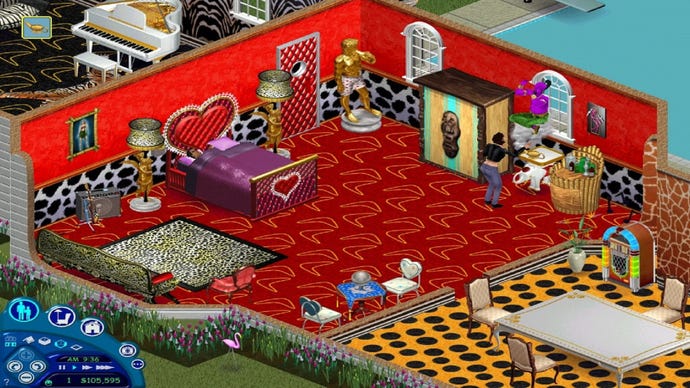
But in order to get their relationship to that level they'll need to be in a good enough mood to get to know each other, which is hard to achieve when they're constantly cranky, sore, hungry, and tired due to living in a barely-furnished three-room cottage that looks infinitely more depressing than my first student house-share. And trust me, that's saying something.
I contend that The Sims 1 is really a structurally very different game from its sequels, which all follow a much more recognisable pattern.
But this is, of course, the nature of The Sims as it was originally designed. I contend that The Sims 1 is really a structurally very different game from its sequels, which all follow a much more recognisable pattern. Sims didn't age in the first game, so even though babies and children were present, they didn't really do much, and the generational aspect that's become a hallmark of the series was all but absent. There weren't even days of the week, let alone changing seasons: life for Sims in this game was made up of an ever-present now, where every day was treated like a weekday in late spring, with school or work taking up the bulk of the waking hours. There was nothing to plan towards, really, other than career advancement and the improved material comforts that could bring. Therefore, keeping your Sims' needs fulfilled, and developing their skills and relationships — all of which were necessary to keep the funds rolling in and earn career promotions — had to be quite difficult. Because, at its heart, this game had only one loosely-defined goal, and infinite time in which to achieve it.
Of course, the first game's seven eventual expansion packs would add in more optional side activities, like going on holiday or adopting a pet. While The Sims was very much built from the offset around the idea of selling regular add-on content, you can see Maxis gaining a better idea of how people actually wanted to play as the series' first generation wore on. The Sims base game and its first couple of expansions presented a fun resource management challenge, don't get me wrong, but the endless cycle of living to work to consume is a bit dystopian when you stop to think about it. It shouldn't come as a surprise that later expansions showed a greater interest in getting Sims out of the house, and breaking up the daily grind with hobbies and excursions that presented the player with something a bit more aspirational, or even fantastical.
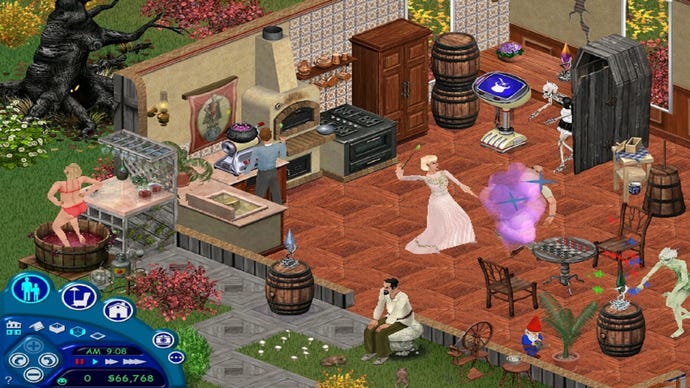
The Sims 1 isn't my favourite Sims game; spoilers for the future, but that distinction goes to The Sims 2, and I suspect always will. But — assuming you can get your hands on the discs, since EA have never seen fit to release it digitally — the original is, in my opinion, the best one to revisit if you're looking for a change from The Sims 4. Not only is it quite a substantially different experience from its more similarly-moulded sequels, but it runs far more smoothly compared to the infamously laggy The Sims 3, or even the complete collection of The Sims 2. Occasional stability issues notwithstanding, The Sims 1 is still enjoyably playable even with all of its add-on content installed, which definitely isn't something you can say for every later entry in the franchise.
If you can't get your hands on the original discs though — or, just as valid, simply can't face the challenge of getting them running on a modern PC — then I feel like you have some alternatives in the pipeline. I get the strong feeling that Paralives is going to be a solid modern indie reimagining of The Sims series with a similar scope to its first entry. That inkling has been backed up by my recent enjoyment of Tiny Life, an indie pixel-art Sims-like that just landed in early access and which is very, very nostalgic for those of us who remember The Sims 1, but with some quality of life improvements cribbed from later entries in the series.
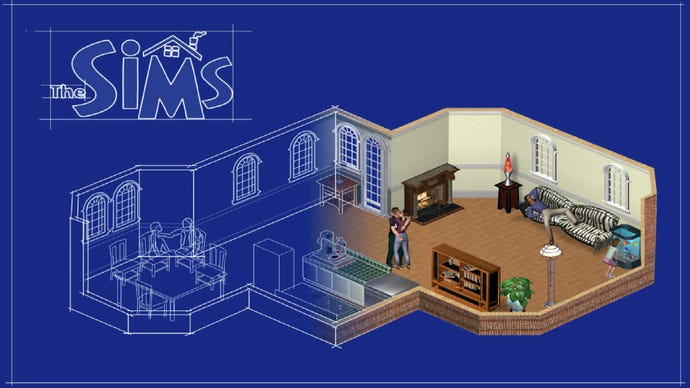
From our vantage point in 2023, we know that EA's moderate gamble on The Sims paid off to an almost ludicrous degree. Every mainline entry in the franchise has been among the best-selling PC games of all time, with the original holding the number-one spot on the list during its lifetime, and each base game easily shifting multiple millions of units apiece. Contemporary reviews suggest that the initial burst of popularity stemmed from the first game's uniqueness: The Sims was reviving a genre that had been declared dead-on-arrival 15 years earlier, scratching an itch many hadn't even been aware was going unsatisfied. There are also many mentions of The Sims' deeply compelling — some reviewers used the more sinister but not unfair descriptor "addictive" — gameplay loop.
The Sims was also among the first blockbuster video games to develop a majority-female player base, with women and girls making up almost 60% of players in the first generation, and held further appeal as a pick-up-and-play game accessible to more "casual" gamers. You can draw some interesting conclusions from all this; namely, I reckon, that building a good-quality game around an under-explored concept in a way that appealed to both "core" and underserved demographics was clearly a winning idea. Hey, just because it's not deep or complicated doesn't mean it isn't likely a major factor in the series' popularity. As for how it's managed to endure for so long… well, that's another story for another day.
